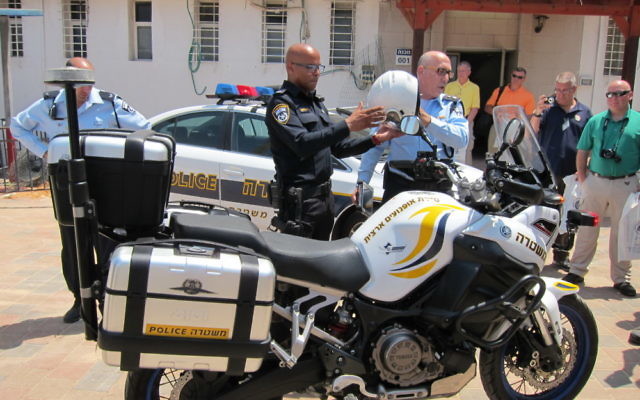GILEE: BDS Requires Active Response
By Robbie Friedmann
I just returned from Israel, where I attended the International Institute for Counter-Terrorism’s 16th annual international conference. From that perspective, Israel, the United States and many countries around the world did not have a very good year.
The public safety prospects for 5777 are not looking much better. At a time when we all wish others and ourselves a good, sweet, healthy and prosperous year, the prospect of increased terrorism looms large above the horizon.
On Sept. 11 we commemorated 15 years since the worst terrorist atrocity in the world’s history. A new generation is growing up for whom Ground Zero is but a tourist site.

While the danger to personal safety is still far larger from vehicular accidents, drug abuse, health malpractice, natural disasters and numerous other factors, none captures the imagination, attention and often misperception of individuals and states as much as man-made disasters — namely, terrorism.
The understanding in the professional community is more of the same this coming year, and many point to the likelihood of using nonconventional means to carry out their operations.
For us, as Jews, there is yet another dimension. “Consoling” ourselves that now terrorism hits indiscriminately many individuals and countries and not just Israelis and Jews is the consolation of fools. Of course terrorism is an international menace, and its aims are more than Israel.
That has more to do with the pyrotechnics of terrorism. Namely, the mode of attack. If it shoots, explodes, stabs or runs over, it gets wide media attention. But there is another mode of attack that is specifically aimed at Israel and Jews and that is a modern incarnation of the old anti-Semitism.
Years after World War II many Jews refrained from resorting to the use of the concept of anti-Semitism so as not to inflate it and thus make it less meaningful and accurate. Yet there is no other way to describe what is happening in arenas such as the United Nations, where the majority of the resolutions are anti-Israel.
There is no other way to describe the BDS activities but as soundly anti-Semitic. Such activities are on an exponential rise on U.S. and European university campuses, and the vitriolic incitement is often translated into intimidation and violence. Case in point is France, but the problem is not limited to that country.
Criticism of Israel is legitimate, and Israel should not be immune from criticism when it is appropriately applied. But when such criticism is aimed only at Israel, and other countries with far worse practices are not getting the same treatment, then such criticism ceases to be meaningful and constructive, and it turns into what it should be called: a hate fest.
It is not meant to improve and correct flaws in Israel. It is aimed at eliminating Israel altogether. Under the guise of “human rights,” BDS is aiming to deny those exact rights from Israel and from Jews. The fact that some Jews and Israelis take an active role in the BDS campaign does not make it any less anti-Semitic. It is not who you are, but rather it is what you do that defines one’s actions.
The BDS movement is attempting to debase the moral foundation that Israel stands on by calling it an apartheid state, by claiming that Israel is a colonialist, settler entity that stole the land from its rightful owners, and by making a host of similar claims that are nothing less than a modern and sophisticated use of the Big Lie technique.
In Atlanta, as in other cities, BDS is focusing efforts on cutting the ties between the Atlanta police and the Israel Police as Black Lives Matter and pro-Palestinian groups join forces as strange bedfellows of “intersectionality.”
Mayor Kasim Reed has publicly said he is “not going to do that” and will also not agree to divest the police budget for other purposes.
This is where the gloomy yet realistic characterization of the outgoing and coming years turns optimistic. Mayor Reed has demonstrated what public resilience can be in the face of such attacks. We cannot ignore, wish the problem away or hide. The onslaught is vigorous, well-funded and deadly serious. (Yes, pun intended, metaphorically and physically alike.)
Israel developed an expertise in fighting terrorism, and the Israel Police accumulated professional and organizational knowledge that made it one of the best police forces around the world. It works in partnerships with many sister agencies in many countries, and it has a great deal to contribute to better policing and is eager to do so.
GILEE is proud to play a role in bringing law enforcement agencies in closer partnerships, not only between Israel and other agencies, but with many countries and many states as well. These partnerships and knowledge sharing constitute a contribution to and an impact on public safety, individual and statewide, not pseudo human rights propaganda. That will not contribute to the betterment of life of Palestinians or of their supporters.
By denying Israel what is seen as elementary for anyone else, the BDS efforts are doomed to fail, but not until we proactively cope with this threat.
The lessons of strong partnerships can and should be adapted from police practice to civil society. Partnerships offer an effective way not only to serve citizens better, but also to display fortitude and resoluteness against looming threats.
Perhaps no less important, being proactive through building partnerships also provides a moral compass that reinforces our well-being and sends a message to those who wish us harm that we are more than ready not to be taken for granted.
With best wishes for a shana tova. May it truly be a good year.
Robbie Friedmann is the founding director of the Georgia International Law Enforcement Exchange and a professor emeritus of criminal justice in the Andrew Young School of Policy Studies at Georgia State University.





comments